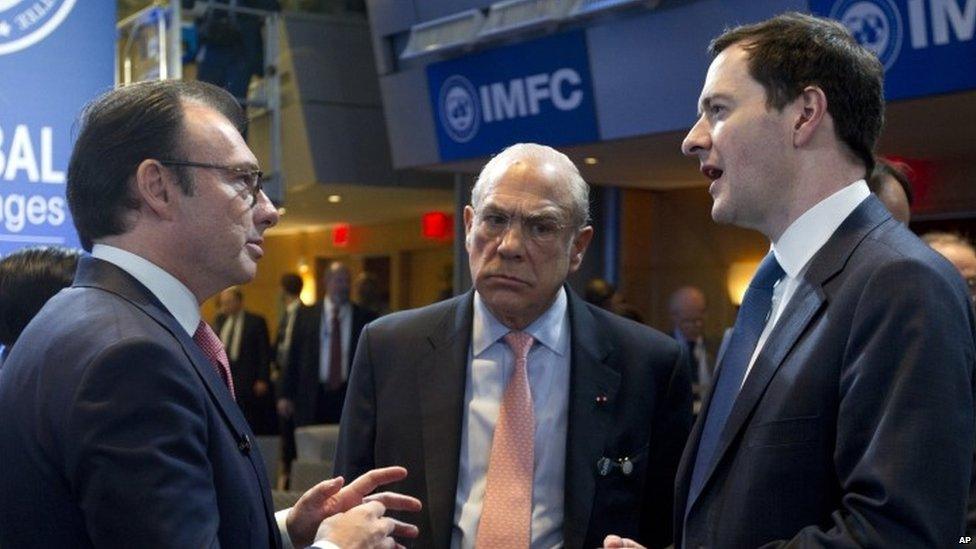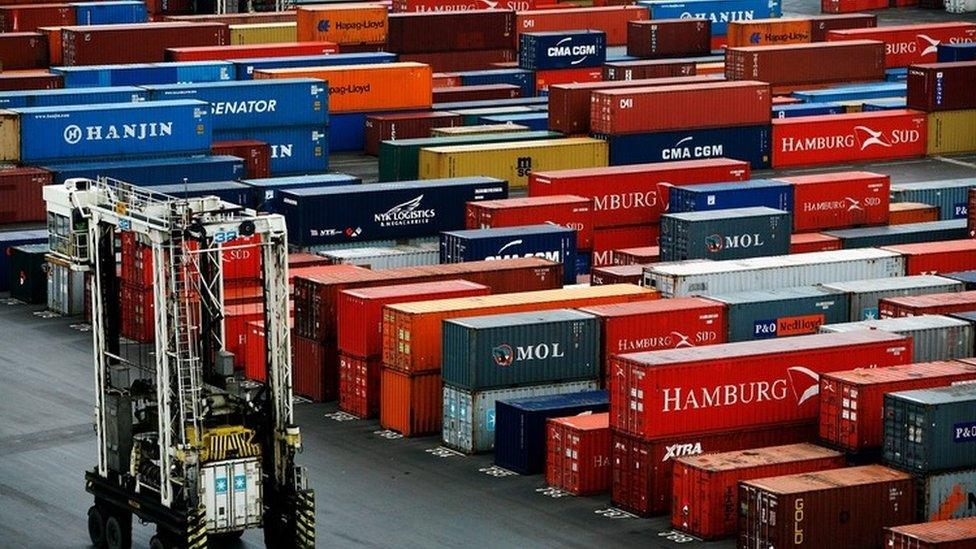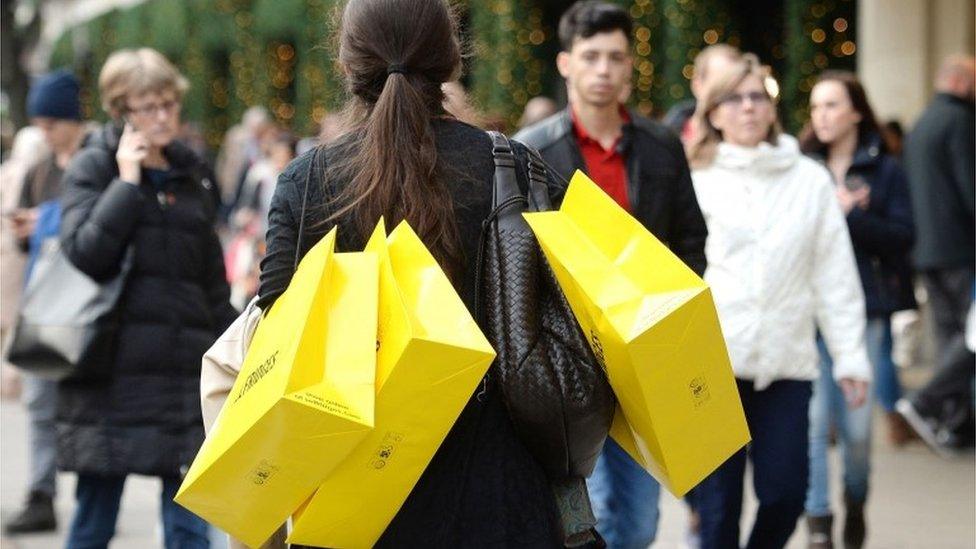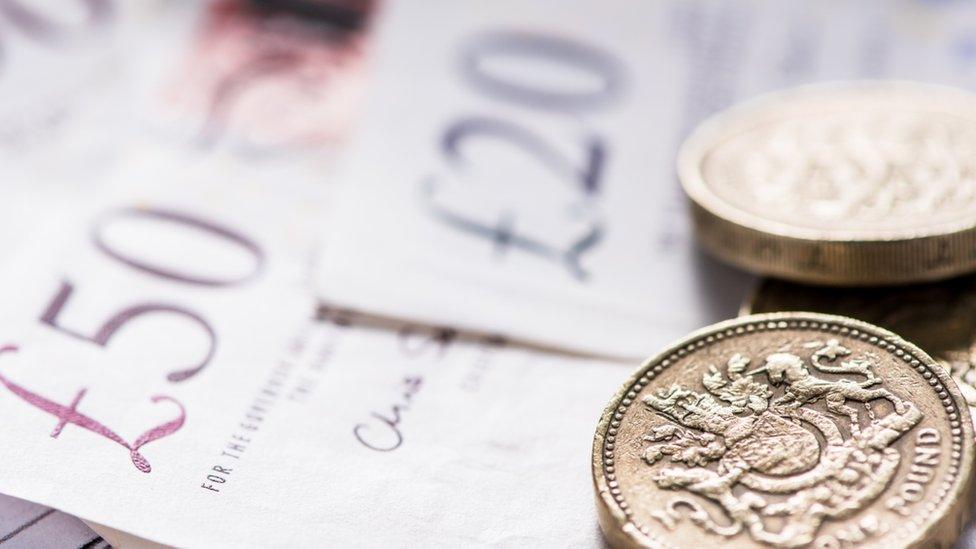EU referendum: OECD warning of 'Brexit tax' sparks row
- Published

George Osborne said the possibility of leaving the EU was having a major impact on business confidence
Leaving the EU would be the equivalent of imposing an additional "tax" of one month's income on UK workers, a leading economic international body has said.
The Organisation for Economic Co-operation and Development (OECD) said economic growth would be lower outside the EU as the UK could not negotiate a "sweeter" deal on trade and investment.
Vote Leave said the forecasts ignored the scope to negotiate new trade deals.
And UKIP's Nigel Farage said "markets, not failed politicians" decided trade.
The OECD, which represents 34 wealthy countries and seeks to promote economic co-operation, released its assessment of the economic consequences for the UK, external of leaving the EU as figures suggested the UK economy slowed in the first three months of the year.
Chancellor George Osborne said the estimated fall in GDP growth from 0.6% to 0.4% suggested the EU referendum on 23 June was "weighing" on the economy and that building projects and investments were being delayed by uncertainty over the outcome.
The OECD's research suggests leaving the EU would result in 3% lower economic growth than would otherwise be the case by 2020, rising to 5% in 2030 - costing households on average £3,200.
Its secretary general Angel Gurria told the BBC that he had no doubt that leaving would be a "bad decision" and expressed surprise that the UK was even contemplating such a move.
'Like a tax'
"Brexit is like a tax. It is the equivalent to roughly missing out on about one month's income within four years but then it carries on to 2030," the former Mexican politician told BBC Radio 4's Today programme.
"That tax is going to be continued to be paid by Britons over time."
Forecasts that growth rates would be lower-than-expected outside the EU were based on the assumption that there was "no kind" of trade deal that the UK could do "better by yourselves than you would be in the company of the Europeans".
"We have done the comparisons, we have done the simulations," he said.

Leave campaigners say the UK will be able to trade more freely outside the EU
"In the end we come out and say: why are we spending so much time, so much effort and so much talent in trying to find ways to compensate for a bad decision when you do not necessarily have to take the bad decision?
"This is not wishful thinking - which we believe that the Brexit camp in many cases has been assuming. There is absolutely no reason why you would get a sweeter trade deal than you already have, no reason why you would have a sweeter investment deal."
Mr Gurria has led the OECD since 2005. While serving in the Mexican government in the 1990s, Mr Gurria helped negotiate the North American Free Trade Agreement with the United States having previously led two major banks.
The OECD's analysis echoes that of the Treasury, which has estimated that GDP would be 6% lower by 2030 and that this could leave households £4,300 worse off.
'Not impartial'
But economist and Leave campaigner Andrew Lillico said the figures were "very implausible" because they assumed that the UK would not be able to secure a trade deal of any kind with the EU before 2020 or preferential deals with other countries before 2023.
"That is just absurd," he told the BBC News Channel. "One of the main reasons we would leave the EU is in order to do new trade deals with the rest of the world, with Japan, Australia and other countries."
Given the OECD was predicating its research on a fall in immigration and a slowdown in population growth, he said the reality was that "once we are past the initial disruption there is no impact on GDP per person at all."
UKIP leader Nigel Farage told BBC Radio 4's Today organisations like the OECD and the IMF were staffed by "overpaid former politicians who failed mostly" and the UK would be "better off" by being able to trade freely outside the EU.
"These international bodies, there is virtually nobody working for them that has manufactured a good or traded a product globally.
"The fact is whether we are in or out of the EU, we will go on buying and selling goods between France, Germany, Britain and Italy because ultimately markets are not created by politicians, it is about consumers making choices."
Labour said there was a twin threat to the economy from "Conservative backbenchers screaming for Brexit despite the mounting evidence against the case" and from a government "refusing to listen to the expanding coalition of international organisations that not only warn of the risks of Brexit, but also the risks of under investing in our economy".
- Published18 April 2016

- Published27 April 2016

- Published21 March 2016

- Published30 December 2020

- Published27 April 2016
